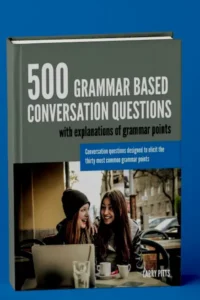If you teach grammar to English language learners, the 500 Grammar Based Conversation Questions book will make your life a whole lot easier.
500 Grammar Based Conversation Questions
It’s a great way for your students to practice grammar in a natural and engaging way while you listen for any problems they are having.
It’s going to save you a lot of prep time as well. Each topic has 17 questions which will fill between 20 and 50 minutes of class time depending on how talkative your students are. You can also pair down the questions for a filler activity, warm-up, or review.
It’s a perfect supplement to any of the major ESL or EFL textbooks that teach the four skills (speaking, listening, reading, writing) and contain a grammar component.
The grammar points are organized with the most commonly taught grammar points at the beginning of the book.
There is also a grammar explanation section for each grammar point that will act as a refresher for teacher.
It may be the only resource book of conversation questions designed to practice specific grammar points.
Let’s face it, grammar can be boring to teach and can definitely be boring to learn.
This book makes grammar lessons more engaging and interesting for intermediate and advanced ESL / EFL students.
I’ve handpicked the most commonly taught grammar points and made conversation questions that allow students to produce the grammar naturally.
For each of the grammar points there are short, simple, and easy to understand explanations. You can give these explanations to your students or use them for yourself as a guide or reminder.
There are at least 17 questions for each of the grammar points. So your students will have plenty to talk about. Plus, they’ll be using the grammar you just taught them in a natural and pain-free way. So what are the grammar points in the book?
simple past, present perfect, simple present, modals of possibility and probability, gerunds vs. infinitives, modals of necessity, modals of advice, comparatives, conditionals real with the future (first conditional), will ,be going to, passive voice in the present, past continuous, reported speech / indirect speech, conditionals unreal with the past (third conditional), conditionals unreal with the present (second conditional), nouns (count / noncount / countable / uncountable), quantifiers, conditionals real with the present (zero conditional), present perfect continuous, superlatives, tag questions, adverbs of frequency, as … as (equatives), imperatives, passive voice with the past, used to / would, for / since, would rather / prefer.


